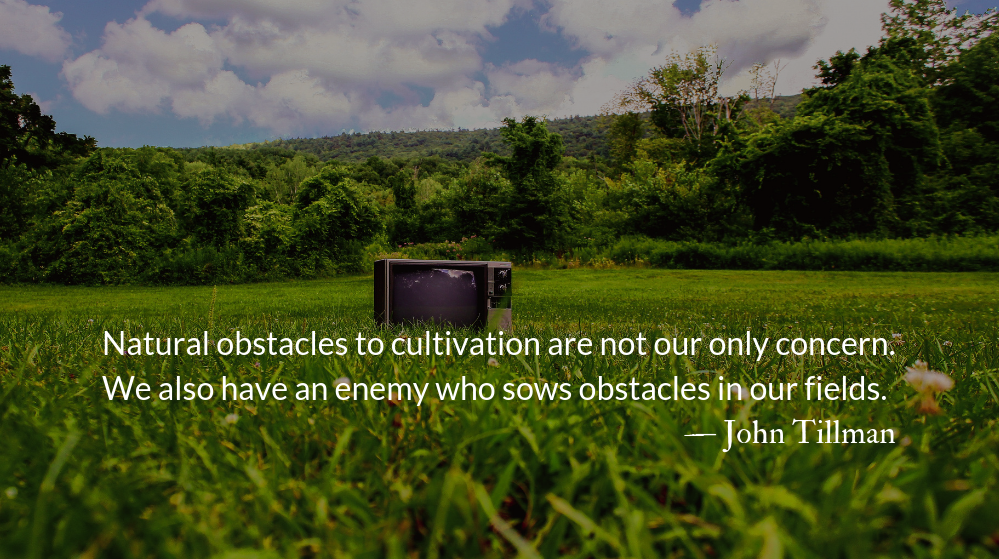Matthew 9.36-38
When he saw the crowds, he had compassion on them, because they were harassed and helpless, like sheep without a shepherd. Then he said to his disciples, “The harvest is plentiful but the workers are few. Ask the Lord of the harvest, therefore, to send out workers into his harvest field.”
Reflection: Cultivation Starts With Destruction
By John Tillman
Cultivation is an act of peace, community, and faith. However, cultivation often begins with the smell of fire, the wielding of sharpened metal tools, and the sounds of chainsaws.
Jesus told the parable of the sower to portray the power of the gospel, not to imply that we should disdain cultivation for simply “scattering” the seed. Instead, he emphasizes the importance of cultivated ground to the gospel’s success.
Cultivated ground must be carved out of the wild brush, moor, or forest. Trees must be felled. Brush, thorns, and grasses must be burned. Rocks and other obstacles must be broken up, destroyed, and removed. But natural obstacles to cultivation are not our only concern. We also have an enemy who sows obstacles in our fields.
Immediately after the parable of the sower, Jesus tells the parable of the tares, which relates closely to our situation today. Among the wealth of cultivated, gospel teaching available, cultural ideas and worldly philosophies get scattered in with the good seed and grow up among our people. Our adversary desires to leave us no space in our land for cultivation.
Historians tell us that salting the earth was more ceremonial than functional. Sowing enough salt into farmland to poison crops for an extended time was too expensive for common practice. When this type of warfare was described in the Bible it was intended more as retribution and punishment than military strategy.
Our adversary’s goal is spiritual starvation and humiliation.
He hems us in with thorns.
He salts our fields with sin.
He sows tares amidst our wheat.
When he tears down our walls, he buries the broken stones in our furrows to break our plows.
This is why the first step of cultivating faith is destruction. And we must start in the field of our own heart, not pointing across the fence at someone else.
May the scripture help us to plow up and destroy the cultural idols, trends, teachings, and brands that hinder our growth.
May we invite the Holy Spirit’s fire to burn what we never should have planted.
May we work in our heart to weed out our prejudices and assumptions.
May we practice generosity that our jealousies may be poisoned.
Salting the earth is an act of war. Cultivation is an act of loving resistance.
Prayer: The Call to Prayer
Taste and see that the Lord is good; happy are they who trust in him! — Psalm 34:8
– Prayer from The Divine Hours: Prayers for Autumn and Wintertime by Phyllis Tickle.
Prayers from The Divine Hours available online and in print.
Today’s Readings
Genesis 9-10 (Listen – 7:18)
Matthew 9 (Listen – 4:56)
Additional Reading
Read More about Cultivating is Supernatural
Cultivation is not natural. It is supernatural. We give plants a safer, healthier place to grow than exists naturally, and they give us better food in greater quantities.
Read More about A Sign of Immaturity
May we, through our spiritual disciplines, develop a mature faith that cultivates signs and miracles of mercy and grace for others, not an immature faith that demands signs of favor and blessing for ourselves.
How far will you travel in God’s Word this year?
On January 1st we restarted our two year Bible reading plan in Genesis and the Gospel of Matthew. Join us on the journey. We read the Old Testament over two years and the New Testament and Psalms each year.
Read with us at a sustainable pace. Subscribe and invite friends to join you using this link.
Where will a journey through the Bible take your faith in the coming year? Jesus calls each of us, saying, “Follow me.”







